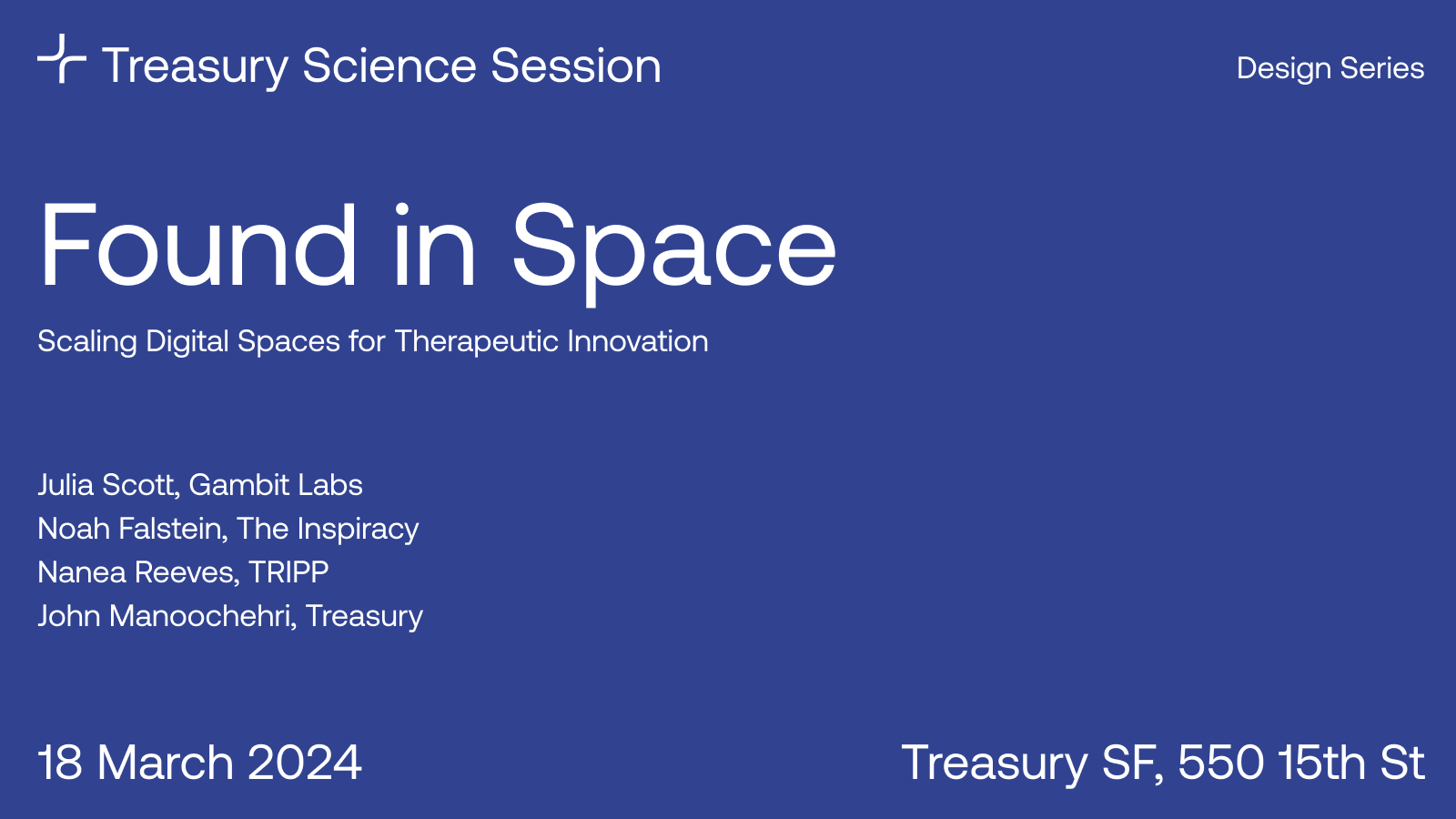Treasury Science

Digital behavioral therapeutics - any form of intervention to improve mental or physical wellbeing - delivered as immersive experiences with VR/XR/AR technology promise a transformational pathway in healthcare practices. The design of the digital spaces and how we engage with them - physically, visually and psychologically - shapes our perception about ourselves and the experience, just like any physical space. Yet these approaches need to be adapted to take account when a digital environment overlaps with a physical environment and the required precision of ongoing measurement, with relation to the specific effects the environment has on the user, at any one moment, across time, and away from the digital experience itself.
Traditional game design principles and technologies are a starting point for creating immersive therapies. Yet these approaches need to be adapted to take account when a digital environment overlaps with a physical environment and the precision of ongoing measurement, with relation to the specific effects the environment has on the user, at any one moment, across time, and away from the digital experience itself. Without a multi-dimensional framework, any claimed therapeutic value must be considered marginal, if not suspect.
The rapidly growing opportunity to use the spectrum of digital spatial technologies for health applications can and should unfold in the direction of evidence-backed claims and alignment with standards for digital health. Yet to have significant impact on population health outcomes, any technology must evolve towards mass adoption and equitable distribution. These objectives are often in tension.
The panel's conversation explores the design decisions involved in creating digital spatial therapeutics, and the strategies - including trade-offs and long plays - required to bring them to scale while respecting the need for user safety and user trust in the legitimacy of the intervention.
Leading the conversation are Nanea Reeves, CEO and Founder of TRIPP, lauded as a best invention of 2022 and the most used meditation app in VR, and Noah Falstein of The Inspiracy, who has over 40 years of game design leadership and designer of numerous games for health, with Julia Scott, cofounder of Gambit Labs and Director of the Brain and Memory Care Lab, and John Manoochehri, Founder of Treasury.
Treasury Science Sessions are open seminars dedicated to fostering comprehension and involvement in spatial technology's applications for health, education, and social betterment. These sessions explore the expansive realm of digital space within the context of human sciences, spanning natural and social sciences, design professions, and various technology disciplines – offering a multidisciplinary approach to understanding the human science of digital space
Speakers
Julia Scott
Co-Founder, Gambit Labs, Director of Brain & Memory Care Lab, Santa Clara University
Julia Scott is a neuroscientist who has studied at various University of California campuses, including Davis, San Diego, and San Francisco. Her research focuses on various aspects of neurodevelopment, brain aging, and neurotechnology. She currently works as the director of the Brain and Memory Care Lab at Santa Clara University, where she explores XR applications in healthcare. Julia also teaches courses in neuroscience, bioengineering, and physiology, with a focus on collaborative learning. Additionally, she is a co-founder of Gambit Labs, where she works on brain-computer-interface immersive games to improve cognitive skills.
Noah Falstein
Founder, The Inspiracy
Noah Falstein has been a professional game developer since 1980 with many hit title credits and was an early hire at LucasArts, 3DO, and Dreamworks Interactive. Most recently he was Google's Chief Game Designer. His freelance design business, The Inspiracy is focused on games for health, specifically neurogaming. The Inspiracy has offered design and production consulting for companies and individuals interested in top quality game development and business contacts. Falstein also lectures and conducts seminars on game design and development, for both traditional and serious games. He has chapters published in six different game industry books, and is working on his own book about game design issues.
Nanea Reeves
CEO & C0-Founder, TRIPP, Inc
As the CEO and Co-Founder of TRIPP, Inc., Nanea Reeves is a visionary leader in the emerging field of immersive wellness. TRIPP, which was named one of Time Magazine's Best Inventions of 2022, is a global service that offers interactive and transformative experiences for mental and emotional well-being on mobile and spatial devices. Nanea founded TRIPP after a personal crisis that inspired her to combine her lifelong meditation practice, her passion for video games, and her extensive software development experience to create a novel and accessible way to help people cope with stress, anxiety, and depression. Nanea has over 20 years of experience in digital distribution, video game technologies, and mobile application development.
John Manoochehri
CEO & Founder, Treasury
Founder & CEO, Treasury Architect and experienced in both computational design and sustainability, John has founded companies in the space of design, data, technology and sustainability. He founded Treasury in 2021 to focus on making the digital environments of today and tomorrow resources for sustainability and human development.
Agenda
5pm – Doors open, drinks available.
5:30pm – Panel Discussion: Found in Space
7pm – Session ends.
Livestream
All livestream guests will be sent a link to the livestream 10 minutes before the event starts.
Register for Event